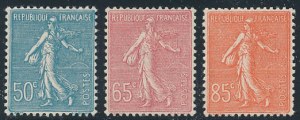One of the most important philatelic events of the early Twentieth Century was the issuance of long definitive sets by major countries that continue in use over a period of many years. The United States issued the Washington-Franklin set and in various forms this set dominated our mail for over thirty years. The same was true of the Post Horn set of Norway and of the Sower set of France. Post Offices were not so obviously after collector money in those days and when they found a design that worked, they stuck with it. The reason that these sets are interesting to collectors today is that because they were in use for so many years hundreds of varieties exist. What is of even greater interest is that for the most part these varieties are not of the minor printing variety type but rather are varieties caused by printing evolution and differing postal needs over the years that the stamps were in use. On the Sowers you have the basic face different set issued over a period of nearly thirty years. There are paper varieties including a type called “Grand Consumption” paper that is a cheap manila stock that was put in use because of World War I paper shortages. As booklets became popular, many of them were issued in the Sower design. The French post office experimented with advertising se-tenants and these too can be found on the Sower issue. Covers abound to foreign destinations and as foreign usages. There are shades and printing varieties and differing press types. And for the most part these stamps are cheap. The Yvert catalog lists hundreds of varieties that Scott doesn’t although Scott is pretty good as well. If you are looking for an interesting specialty that combines the search with research all for not a lot of money, the French Sower issue may be your answer.



